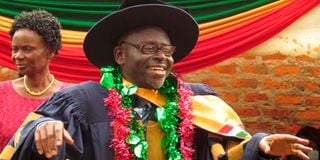Premium
Renowned folk music teacher adds another feather in his cap

Dr Isaac Shitubi of Moi University celebrates in Kimilili, Bungoma County, after graduating with a PhD in Education Communication and Technology, specializing in Luhya music.
When it comes to local music stars, few may have heard of Dr Isaac Waswa Shitubi, one of the behind-the-scenes movers and shakers of the schools and universities’ music festivals.
Dr Shitubi is an expert educationist in traditional Luhya music and an authority on composition, choreography and criticism. He is a leading author of Kenyan music, a choir master, an oral narrative composer and director and a music adjudicator.
For over two decades, Shitubi had dedicated much of his working life on teaching music and thousands of students in western Kenya have passed through his hands.
Last week, Dr Shitubi achieved another milestone when he graduated with a PhD in Education Communication and Technology, specialising in music education. His thesis title was Instructional methods and students practical musicianship; a study of students of music in secondary schools in Bungoma County.
This is no mean feat for a person who honed his skills in teaching music at Friends School Kamusinga, where he taught the subject (with excellent results) for 15 years.
To celebrate his latest achievement on becoming a doctor of music and his musical journey, the teacher hosted a celebration in Kimilili, Bungoma County.
“I teach traditional music and folklore, which is why I chose to celebrate in the village,” said Dr Shitubi, who is also the director of the Moi University Choir and Dramatics Society.
Dr Shitubi really has the village in his heart. He is the founding director of Eagle Bird Music Academy in Kimilili. The school, the only one of its kind in western, teaches composition, vocalisation as well as dance.
It also offers lessons on playing instruments such as piano, guitars, violin as well as African traditional instruments such as litungu, orutu (African fiddle), marimba and ishiriri.
Dr Shitubi, who is currently an assistant lecturer of music education in the Department of Curriculum Instruction and Educational Media at Moi University, made a name for himself after winning various performances at the Kenya Music and Drama Festivals.
He was a master in fusing music and dance with oral narratives, a skill that gave his performers an upper hand in the festivals.
He is an author and music composer with special focus on ethno-musicology and music education. He has authored various journals and book chapters in a variety of journals.
The most authoritative among them is Fuging African Songs; A focus on Luhya Music and his contribution in Emerging Solutions of Musical Arts Education in Africa. The former is a discourse on current theory and practice of African dance criticism and choreography
In the book, the author observes that the use of western techniques distorts African music. Consequently, he strongly argues for the need to establish original African techniques that can be used in arranging Luhya traditional folk tunes to help avert the problems arising from entirely relying on Western fugal techniques.
This book is highly useful to composers, arrangers, enthusiasts and scholars of African traditional music in Kenya and beyond.
In his book, Instructional methods and students’ practical musicianship: a study of students of music in secondary schools in Bungoma County, Kenya, Dr Shitubi concluded that there is a serious deficiency of traditional musical instruments in the schools that offer music as a subject in the county.
It is recommended that schools should provide instrumental and vocal lessons, strike a balance between practical and theoretical components of the curriculum to ensure each of these components are exhaustively taught and learned.
“Majority of the students of music have positive attitudes towards practical musicianship. However, most institutions do not offer them enough support and facilitation,” says Dr Shitubi in the book.
He feels that more support and exposure should be given to traditional music both in learning institutions and the media.
Traditional songs and dances, he says, should receive more airplay and recognition from the government and other bodies since they are not only instruments of culture and history but also contain rich materials that cannot be found in foreign music.
“There should be a stronger marketing of music activities to ensure learners are fully aware of the music opportunities in the schools and as way of earning a livelihood,” says Dr Shitubi.





